
Guests
- Erica Garnereldest daughter of Eric Garner.
- Ramsey Ortafriend of Eric Garner. He filmed the police killing of Garner in New York in 2014.
- Reggie Harrisadviser to Erica Garner and director of organizing at the Black Organizing Project.
As Sgt. Kizzy Adonis becomes the first officer to face reprimand for Eric Garner’s death, the only person present that day to be criminally charged is the young man who filmed it. Ramsey Orta, who recorded the fatal chokehold on his cellphone, has been arrested multiple times since. Orta says police have deliberately targeted him for capturing Garner’s death on video and exposing it to the world. Supporters rallied for Orta on Monday at a court appearance on Staten Island. Orta joins us along with Eric Garner’s daughter, Erica Garner, and Reggie Harris, a member of the Black Organizing Project.
Transcript
AMY GOODMAN: I want to go back to that day in August of 2014, to the police—it was July of 2014. Ramsey Orta, I—we have seen your video countless times, the world has seen this video, but we have rarely heard your voice. Talk about what you saw happen that day and what inspired you to flip open your cellphone and start filming.
RAMSEY ORTA: What I saw that day was NYPD murder my friend. And what inspired me to take the video, because I have past videos of NYPD abusing their power with people I associate with.
AMY GOODMAN: And so, you started filming.
RAMSEY ORTA: Yes.
AMY GOODMAN: You didn’t stop.
RAMSEY ORTA: No.
AMY GOODMAN: Your hand is remarkably steady as we show this video.
RAMSEY ORTA: Yes.
AMY GOODMAN: What were you thinking?
RAMSEY ORTA: It’s about to go down. And I just had to make sure I stood there, and make sure I had got every detail and I didn’t miss nothing.
AMY GOODMAN: And what were you feeling as you are filming? You were a friend of Eric Garner’s.
RAMSEY ORTA: I was upset. I mean, you can clearly hear it in the video. I was running my mouth in the video, but yeah, I was highly upset.
AMY GOODMAN: What were you saying?
RAMSEY ORTA: I was cursing, calling them names and telling them to leave him alone, and that I have witnessed that he wasn’t selling any loose cigarettes, that he just had broke up a fight.
AMY GOODMAN: Well, explain that. He was known for selling loosies, loose cigarettes, but actually, on this day, there had been a fight in the street, and he had gone to mediate the fight, like to try to break it up?
RAMSEY ORTA: Yeah, the fight had broken out maybe two feet away from us. He jumped up and separated them. As soon as he separated them, the cops came out of the car and targeted Eric.
AMY GOODMAN: What has happened to you since July 17, 2014? First, what did you do with that video?
RAMSEY ORTA: First, the Daily News got in contact with me and asked me if I had any pictures, and I told them, “I got a video,” and we took it from there. And from then on, I’ve been targeted by NYPD. I got five pending cases right now—two in Supreme Court, three in criminal. Since then, I’ve just been harassed. I’ve been almost killed in Rikers Island.
AMY GOODMAN: How long were you held at Rikers Island? We interviewed your aunt at the time that you were in Rikers.
RAMSEY ORTA: I was in Rikers two separate times, one for 60 days and one for 30 days, I believe. And the 60-day stay was the time that I went on the hunger strike.
AMY GOODMAN: For how long?
RAMSEY ORTA: A month and a half.
AMY GOODMAN: What were you striking about?
RAMSEY ORTA: The rat poison, and I didn’t want to eat nothing that Rikers provided me to eat.
AMY GOODMAN: Why? What do you mean, rat poison?
RAMSEY ORTA: There was rat poison in the food.
AMY GOODMAN: Did you think you were being targeted?
RAMSEY ORTA: Yes.
AMY GOODMAN: Now, you were arrested. Your wife was also arrested?
RAMSEY ORTA: Yes.
AMY GOODMAN: What was—why was she arrested?
RAMSEY ORTA: She got arrested for assault charges that was allegedly caught on camera. And now we come here today, and the charges brought up against her are dropped.
AMY GOODMAN: You have been arrested on—for drug offenses. In one of those arrests, you said that the police officer said to you, “You videoed us, now we’re videoing you.”
RAMSEY ORTA: Mm-hmm.
AMY GOODMAN: Can you explain when that was and what they said?
RAMSEY ORTA: Clearly, when they jumped out on me, that was the first thing that came out his mouth: “You filmed us, so now we’re filming you,” because I asked, “Why do you have your cameras out?” When they jumped out on me, they had their phones in their hand, instead of a gun or anything, from my knowledge, was supposed to be in their hand. So I asked him: Why is he filming me? And he said, “Because you filmed us.”
AMY GOODMAN: Are you sorry you filmed the death of your friend, Eric Garner?
RAMSEY ORTA: No.
AMY GOODMAN: Are you sorry you put it out for the world to see?
RAMSEY ORTA: No. I am sorry for not having a legal defense before I actually put the video out there. Other than that, I don’t regret nothing.
AMY GOODMAN: What do you mean, a legal defense?
RAMSEY ORTA: As far as lawyers and people that I know that can protect me for any retaliation from happening.
AMY GOODMAN: Have you sued the New York Police Department?
RAMSEY ORTA: No.
AMY GOODMAN: Do you plan to?
RAMSEY ORTA: Yes.
AMY GOODMAN: Why?
RAMSEY ORTA: Took my life away from me, took my friend’s life away from me. There’s nothing more I could say.
AMY GOODMAN: What do you say to Ramsey Orta, Erica? Soon after your dad died, there was a big service in Staten Island at a church, and when Ramsey Orta’s name was mentioned, the entire—all of the people there—and this church was packed to the rafters—applauded. What has Ramsey Orta meant to you and your family?
ERICA GARNER: Like a hero. I just want to say that, you know, hearing him, being in the same room with him, hearing the words come out his mouth instead of just reading it in a newspaper, it really hits home. There was a lot of craziness in the beginning, but my family always respected the fact that he recorded this video. But, you know, in a way, I feel like I could have been there for him a little bit more. But I just—I just don’t know how. Like, we was put in this position. Both our lives was destroyed. The police, with the constant—I get harassed on Twitter. You know, he get harassed in person. And, you know, I’m just here for him, you know, whatever he needs. I want to use, you know, whatever I’m doing, the work that I’m doing now, to really capture his voice. He hasn’t been really recognized in the media. And I just want to, you know, be able to project that to the world, you know, about the way things happened, knowing firsthand what’s going on with his cases and then keeping people updated on what he’s being charged with and his cases and stuff. I just want to offer support. You know, my family, we talk about him a lot, you know, and we say how it’s disgusting how they keep wanting—targeting him. Like, when he was in jail and being rat poisoned, with the rat poison in his food, like, I was hurt. Like, he’s already like there and not supposed to be there, and now you’re all trying to kill him. And he—
AMY GOODMAN: What proof did you have that there was rat poison in your food, Ramsey?
RAMSEY ORTA: I was serving the food, for one. And two, a couple of my friends had saved some of the food, and when the time came, we gave it to Department of Health, and they brung back the labs saying that it was rat poison.
AMY GOODMAN: We’re also joined by Reggie Harris, adviser to Erica Garner, director of organizing at the Black Organizing Project, speaking to us from San Francisco. Can you talk about the significance of what’s taking place right now? Eric Garner’s family—the latest news, the grand jury refusing to indict the prosecutor in the case, now the congressmember from Staten Island, but one officer has been internally charged, not criminally indicted, Kizzy Adonis. Your thoughts?
REGGIE HARRIS: First of all, thank you for having me. Ramsey, I’m sorry I couldn’t be there in the room with you, but you are a hero. And, you know, I’m here for you in any way I can be.
Just a little bit of background about Staten Island: It’s populated largely on the south side of the island from people—or by people from South Brooklyn that went there as a result of white flight. And so you have a tension there between the people on the south side of the island and the people on the north side of the island. Eric Garner was killed on the north side of the island. Most of the minorities are located on the north side of the island. However, three out of every five New York City police officers reside in Staten Island. And so, when you look at situations where Daniel Donovan—where Daniel Donovan, the DA at the time, getting promoted now to Congress, and he runs this entire race without mentioning Eric Garner hardly at all. We’re looking at situations where, on that island now, because politically you want to appease the police officers that reside there, you know, Debi Rose is endorsing Mike McMahon, who is the new DA, at the same time while you have Pat Lynch, the president of the Police Benevolent Association, of the police union, endorsing the same man. It’s an incestuous cesspool of kind of cover-ups and double dealing there. You know, the Democrats on Staten Island are no better than the Republicans.
AMY GOODMAN: Before we—
REGGIE HARRIS: And so, when you take a look at—
AMY GOODMAN: Reggie, before we wrap up, I wanted to ask Erica, as you speak about Congress, are you thinking of running for Congress, Erica Garner?
ERICA GARNER: What I want to do is I want to organize black and brown—the black and brown folk on Staten Island. I want to knock on doors. I want to ask the people of Staten Island about their issues firsthand, because no one is talking about, you know, what’s going on in Staten Island. So, if I do decide to run for Congress, I want to, you know, be one of those elected officials that get into office and don’t turn their backs on people. I want to be one who wants to hold people accountable and get the corrupted out. I want to be able to treat—the same way how they treat whistleblowers, I want to be able to point out the corrupted elected officials and get them out.
AMY GOODMAN: And what are your plans, Ramsey?
RAMSEY ORTA: Plan is just to keep spreading the word of Copwatch and make sure everybody has knowledge and—
AMY GOODMAN: You’re going to keep filming?
RAMSEY ORTA: Yeah, I’m going to keep filming.
AMY GOODMAN: I want to thank you both for being with us—we’ll continue this conversation afterwards and put it online at democracynow.org—Ramsey Orta, Erica Garner, Reggie Harris.


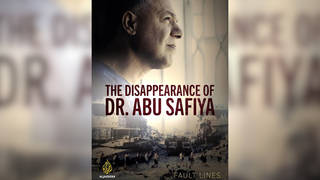
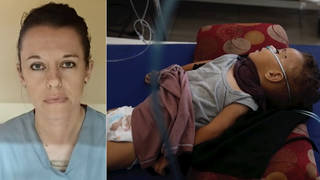
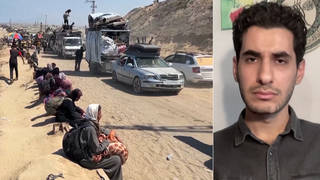





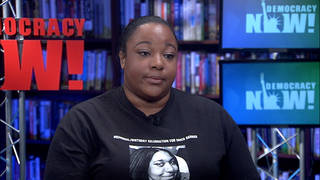
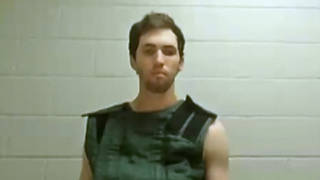
Media Options